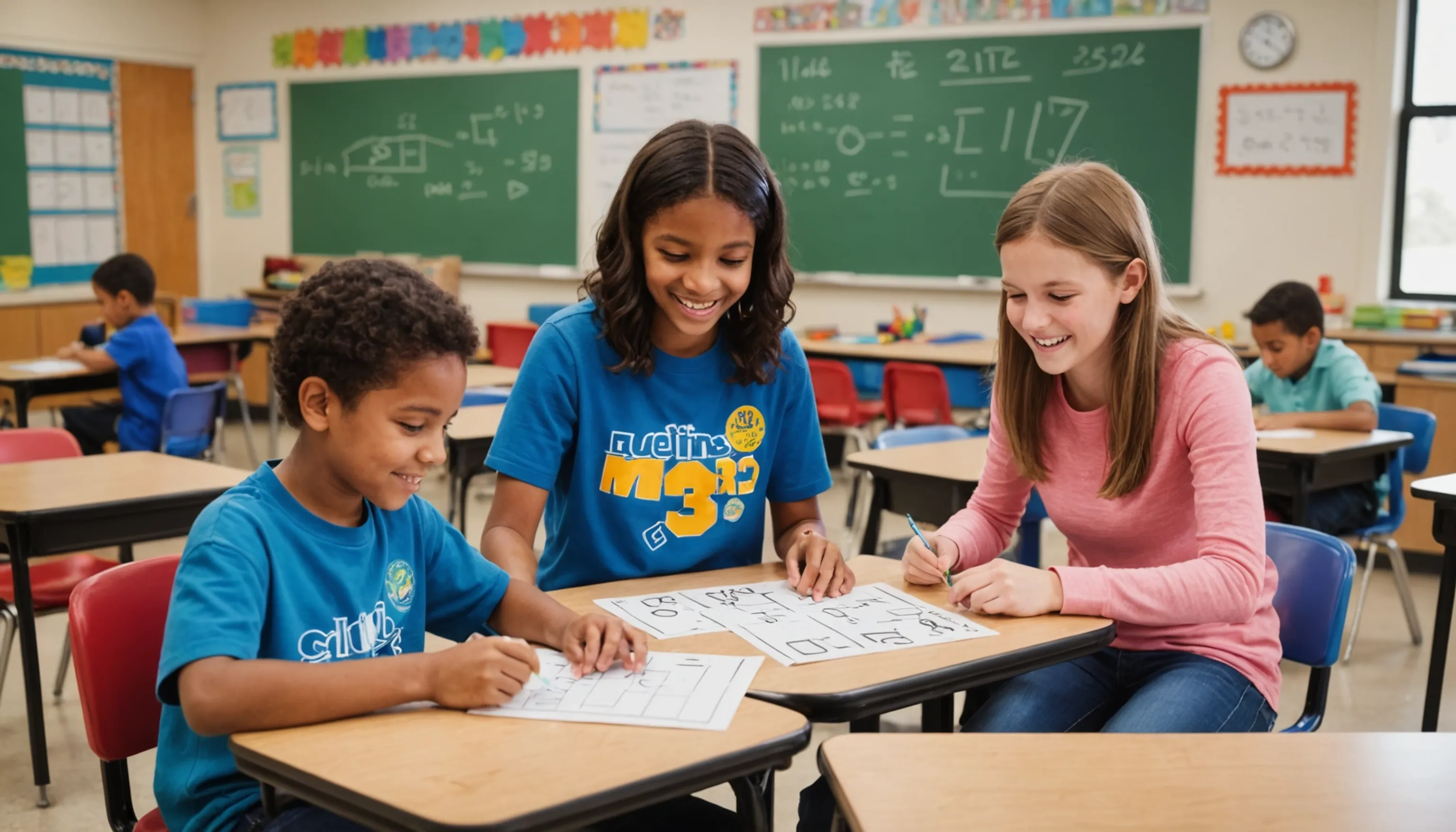You Need to Connect Positive Emotions with Learning Math
 HvWHenry van Wagenberg
HvWHenry van Wagenberg
Connecting Positive Emotions with Learning Math
Connecting positive emotions with learning math is crucial for enhancing students' overall experience. When teens feel happy, confident, and engaged, they are more likely to absorb mathematical concepts effectively. Positive emotions can lead to increased motivation and a willingness to tackle challenging problems. By fostering a supportive environment, parents and teachers can help students associate math with enjoyable experiences. This connection can be achieved through interactive lessons, collaborative group work, and encouraging discussions that emphasize the fun side of math. Ultimately, creating positive associations with math can significantly boost students' performance and confidence.
The Importance of Emotions in Learning
The importance of emotions in learning cannot be overstated, especially in subjects like math. Emotions play a vital role in how students engage with the material, process information, and retain knowledge. Positive emotions such as joy, curiosity, and excitement can create a conducive learning environment, while negative emotions like anxiety and frustration can hinder a student’s ability to learn effectively.
Research indicates that when students experience positive emotions, their brains are more receptive to new information. For instance, a study published in the journal Emotion found that students who felt happy while learning demonstrated better problem-solving skills and creativity. Conversely, students who felt stressed or anxious often struggled to focus, leading to lower performance in math.
Furthermore, emotions can influence students' motivation levels. When learners associate math with positive experiences, they are more likely to engage in self-directed learning and persist through challenges. This connection is essential for developing resilience and a strong work ethic.
To harness the power of emotions in learning, educators and parents should strive to create an emotionally supportive atmosphere. This can be achieved through positive reinforcement, encouraging exploration, and fostering a sense of belonging in the classroom. By recognizing the emotional aspect of learning, we can help students develop a healthier relationship with math and empower them to reach their full potential.

How Positive Emotions Enhance Math Skills
Positive emotions play a crucial role in enhancing math skills for students. When learners experience feelings of happiness, interest, or enthusiasm while engaging with mathematical concepts, their cognitive abilities improve significantly. According to research, emotions can influence the brain's learning capacity by enhancing memory retention and problem-solving skills.
One of the key ways positive emotions enhance math skills is through increased motivation. When students feel good about their math learning experience, they are more likely to participate actively in class, ask questions, and seek help when needed. This proactive approach not only boosts their confidence but also deepens their understanding of the subject matter.
Moreover, positive emotions can reduce anxiety, which is a common barrier in learning math. Students who associate math with enjoyable experiences are less likely to feel overwhelmed or fearful when facing challenging problems. This emotional resilience allows them to tackle complex equations with a more open mindset, ultimately leading to improved performance.
Additionally, positive emotions encourage a growth mindset, which is essential for mastering math skills. When students believe that their abilities can improve through effort and practice, they are more likely to embrace challenges and persist through difficulties. Teachers and parents can foster this growth mindset by celebrating students' efforts, emphasizing progress over perfection, and creating an engaging learning environment.
In summary, cultivating positive emotions in math learning is vital for enhancing students' skills and overall academic success.
Strategies to Foster Positive Emotions in Math Learning
Fostering positive emotions in math learning is essential for student success. Here are some effective strategies:
- Create a supportive environment: Encourage open communication and teamwork among students.
- Incorporate games: Use fun, interactive math games to make learning enjoyable.
- Relate math to real-life: Show how math applies to everyday situations to increase relevance and interest.
- Encourage a growth mindset: Teach students that persistence and effort lead to improvement.
- Celebrate achievements: Recognize both small and large accomplishments to boost confidence.

Using Games to Create a Fun Learning Environment
Using games to create a fun learning environment is an effective strategy for enhancing math skills among students. When math is presented as a game, it transforms the learning experience into an enjoyable activity, reducing anxiety and fostering positive emotions. Games can engage students in a way traditional teaching methods often cannot, making complex concepts more accessible and enjoyable.
One popular method is incorporating board games and card games that focus on mathematical principles. For example, games like Math Bingo or Fraction War allow students to practice their skills in a competitive yet friendly atmosphere. These games not only reinforce knowledge but also promote critical thinking and quick problem-solving.
Online math games and apps have also gained popularity, offering interactive platforms where students can learn at their own pace. Websites like Kahoot! and Prodigy provide a range of math challenges that adapt to various skill levels, making learning personalized and fun.
Furthermore, incorporating group games can enhance social interaction among students. Working together to solve puzzles or complete challenges fosters teamwork and communication skills, essential for their overall development. In addition, these collaborative experiences build a sense of community within the classroom, making students feel more connected and engaged.
Overall, using games in math education not only makes learning more enjoyable but also enhances retention and understanding. By integrating playful elements into the curriculum, educators can cultivate a positive emotional connection to math that encourages lifelong learning.
Incorporating Real-Life Applications of Math
Incorporating real-life applications of math into the curriculum is a powerful strategy for enhancing students' understanding and appreciation of the subject. When students see how math relates to their daily lives, it can ignite their interest and motivation. Real-life applications help demystify abstract concepts and provide context, making learning more relevant and engaging.
One effective approach is to use everyday situations that require mathematical reasoning. For instance, discussing budgeting and financial literacy can help students understand the importance of addition, subtraction, and percentages. By creating a mock budget for a school event or a personal savings plan, students can practice their math skills while gaining valuable life lessons.
Another engaging way to apply math is through cooking and baking. Recipes often require precise measurements and conversions, allowing students to practice fractions and ratios. Teachers can organize cooking classes or simple cooking projects where students calculate ingredient quantities for different serving sizes, reinforcing their understanding of proportions.
Furthermore, incorporating technology can enhance real-life applications. Using apps that allow students to track distances or analyze data, such as fitness trackers, can demonstrate how math plays a role in health and wellness. This not only makes math more relatable but also encourages students to think critically about their everyday choices.
Ultimately, by integrating real-life applications of math into lessons, educators can create a more dynamic learning environment. This approach fosters a deeper understanding of mathematical concepts while helping students develop essential skills they will use beyond the classroom.
Encouraging a Growth Mindset in Math
Encouraging a growth mindset in math is essential for fostering resilience and perseverance among students. A growth mindset is the belief that abilities can improve through effort and practice. To promote this mindset, educators can emphasize the value of challenges and mistakes as learning opportunities.
For instance, praising students for their hard work rather than just their intelligence can help reinforce the idea that effort leads to improvement. Additionally, providing constructive feedback and encouraging students to set achievable goals can boost their confidence and motivate them to embrace difficult math concepts.
Celebrating Small Achievements in Math
Celebrating small achievements in math is a vital strategy for fostering positive emotions and motivation among students. Recognizing even minor successes helps build confidence and encourages students to continue their learning journey. When students feel that their efforts are acknowledged, they are more likely to engage with the material and take on new challenges.
One effective way to celebrate small achievements is through a reward system. Teachers can create a points-based system where students earn points for completing assignments, participating in class discussions, or mastering specific skills. These points can be exchanged for small rewards, such as stickers, certificates, or extra recess time, which can motivate students to strive for excellence.
Additionally, creating a “math wall of fame” in the classroom can showcase students’ work and achievements. This visual representation of success not only boosts individual confidence but also inspires peers to strive for their goals. Teachers can also incorporate regular check-ins to discuss progress, encouraging students to share their accomplishments with the class.
Furthermore, incorporating reflective practices can help students recognize their growth. Encouraging them to maintain a learning journal where they write about their achievements and challenges can foster a sense of ownership over their learning process. Over time, this practice can help students develop a more positive relationship with math.
In summary, celebrating small achievements in math not only enhances motivation but also cultivates a supportive classroom environment. By acknowledging progress, educators can empower students to embrace learning with enthusiasm and confidence.
Providing Positive Feedback and Support
Providing positive feedback and support is crucial in fostering a healthy learning environment for math students. Positive feedback reinforces students' efforts and achievements, helping them build self-esteem and confidence in their mathematical abilities. When students receive constructive and encouraging feedback, they are more likely to engage with the material and persist through challenges.
One effective strategy for delivering positive feedback is to focus on specific aspects of a student's work. Instead of generic praise, teachers can highlight what the student did well, such as solving a problem correctly or demonstrating a clear understanding of a concept. This targeted feedback not only acknowledges their success but also guides them on what they should continue doing in their learning process.
Additionally, offering support during difficult tasks is essential. Teachers can create a supportive atmosphere by being approachable and available for questions. Encouraging students to ask for help when they encounter challenges can alleviate anxiety and promote a sense of community in the classroom.
Another key aspect of providing support is to foster peer collaboration. Pairing students to work together on math problems can create opportunities for them to learn from one another while receiving encouragement and guidance. This collaboration helps students feel less isolated and reinforces the idea that math is a shared journey.
In conclusion, providing positive feedback and support significantly impacts students' attitudes toward math. By recognizing their efforts and creating a nurturing environment, educators can help students develop a lifelong appreciation for learning and confidence in their mathematical abilities.
